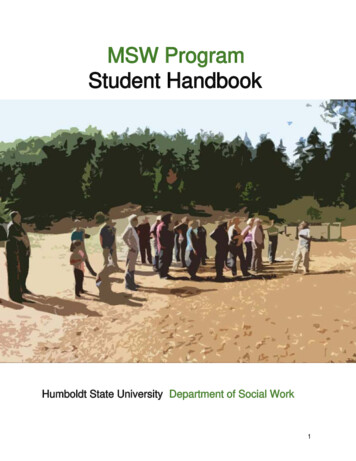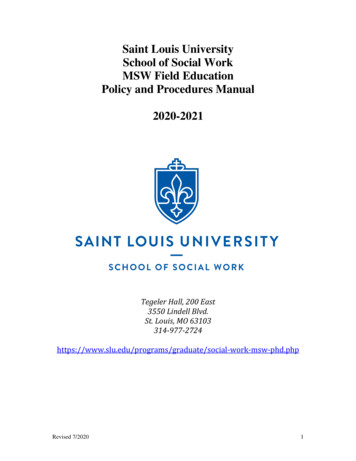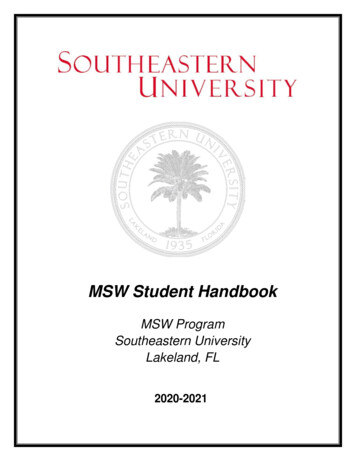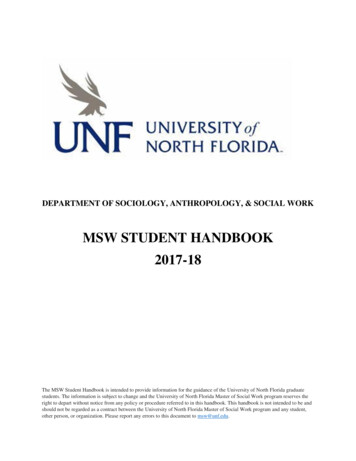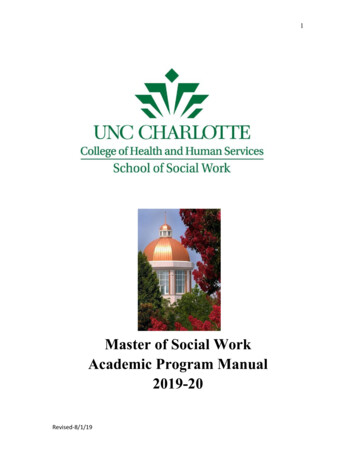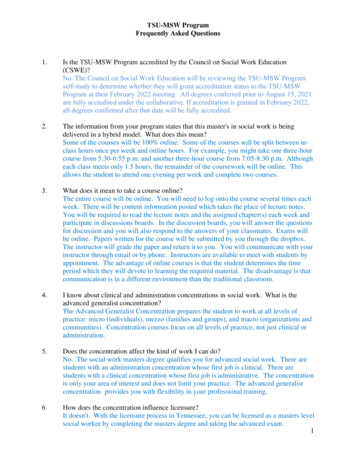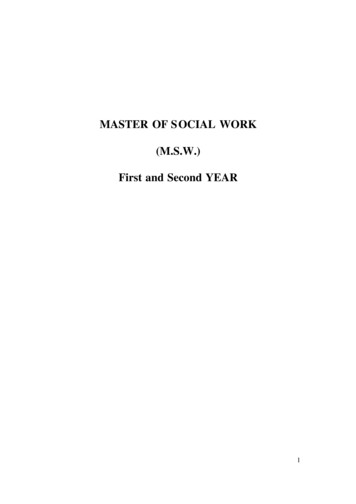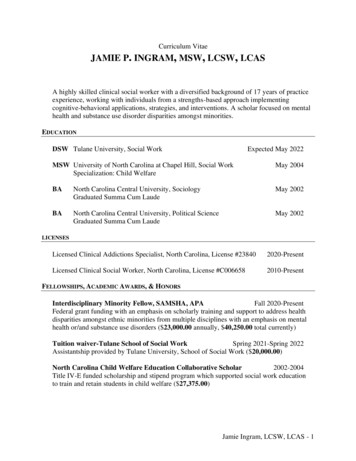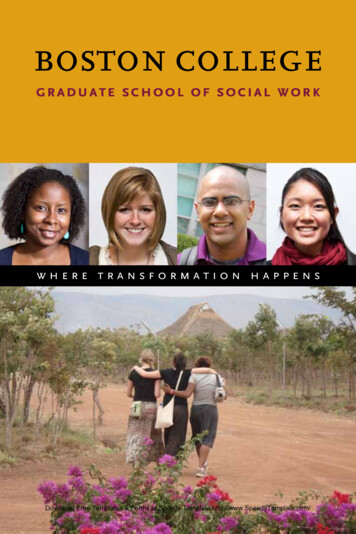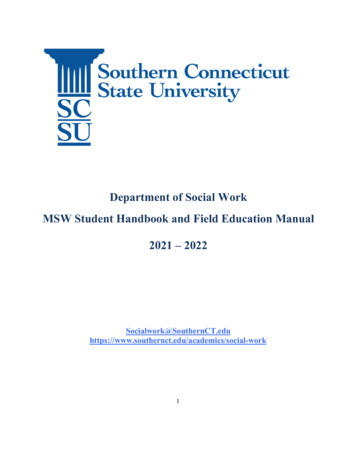
Transcription
TAMUT MSW Student HandbookMaster of SocialWorkStudent HandbookTexas A&M University-Texarkana
TAMUT MSW Student HandbookContentsIntroduction . 3Program Mission Statement and Goals . 4Program Eligibility. 5How to Apply. 7MSW Degree Requirements . 9Field Practicum and Licensure. 12Student Rights and Responsibilities. 13Professional Behavior, Policies and Procedures . 16Participation in MSW Student Affairs . 18Contact Us . 19
TAMUT MSW Student HandbookIntroduction“When a flower doesn’t bloom you fix the environment in which it grows, not the flower."– Alexander Den HeijerDear MSW Students:Welcome to the MSW program at Texas A&M University-Texarkana! You have made animportant decision to pursue a career in social work. Social work is a profession with roots thatextend into nearly all walks of life. It is a very noble profession that is geared toward helpingthose who are often the most neglected of society. Social work seeks to ennoble thedisenfranchised through educating individuals who are professional, ethical, and highly skilled.This is a challenging program, but you were selected to be part of the MSW program becauseyou have demonstrated a commitment to helping vulnerable populations, promoting socialjustice, and a respect for individual worth. You will have many opportunities to engage inapplied learning, be steeped in scholarship, and become a talented professional. MSW graduatesfrom Texas A&M Univeristy-Texarkana are prepared for careers in mental health settings,hospitals, women’s shelters, child welfare, addictions, and other interesting agencies that servepeople in need. We, as faculty and staff, are excited that you have chosen to pursue a degree insocial work and are committed to your successful completion of the program.We are pleased to have you a part of the social work family at Texas A&M-Texarkana andwish you well in the next two years.Kristine Yells, Ph.D., LCSW-S, ICST, CATPMSW Program DirectorLast Updated: 12/10/2020/23/2017Page 3
TAMUT MSW Student HandbookProgram Mission Statement and GoalsMission StatementThe purpose of the Texas A&M University-Texarkana Master of Social Work program is toeducate students to address regional problems such as poverty, inequality, and trauma, and topromote community health and wellbeing at the micro, mezzo, and macro levels. The program isdesigned to accomplish this by creating and maintaining a strong link between the university andthe community through field partnerships, service, and research. Students will graduate ascompetent social workers who are job ready and prepared for the challenges they will encounter asthey help strengthen the community and advance opportunities for all of its citizens.Program GoalsThe TAMUT MSW program has developed the following program goals:1. Prepare students to be social work professionals who can intervene with individuals, groups,communities, organizations, and society.2. Prepare students to promote racial and social justice within micro, mezzo, and macro contexts.3. Enhance students’ classroom learning through experiential and service learning to prepare themto make an impact in their field work and beyond.4. Engage with the community and work in partnership to address local and regional concernswith evidence-based interventions.5. Educate students in the importance of the person-in-the-environment and ecologicalframeworks and how they give context to providing trauma-informed care.Last Updated: 12/10/2020/23/2017Page 4
TAMUT MSW Student HandbookProgram EligibilityThe MSW is a competitive admission program. Due to current university andaccreditation standards, no more than 30 students will be accepted to begin each academicyear. Students submit their applications in December, are notified regarding their admissionstatus in March, and those who have been accepted begin the program in the following fallsemester (for exact dates, visit our website at:Requirements for admission to the MSW Program include:1. Hold an earned baccalaureate degree from a regionally accredited college or university2. Have achieved a grade point average of 2.8 overall or in the last 60 hours of academiccourse workThe following are recommended courses that, although not required, will help you better prepare forthe MSW program:Abnormal Psychology. Courses with substantial contents on abnormal psychology, mental healthdeviance, drug addictions, violence, etc.; Life Span Development; Any biology course coveringanatomy and physiology that emphasizes the impact of organic, chemical, and body systemsimpairments on human behavior (Note: not Introduction to Biology); Social Science with Macrocontext. (e.g. social institutions, organizations, systems, policies. Intro to Sociology, AmericanGovernment, Political Science.)In addition to the above-mentioned requirements, favored applicants show:3.4.5.6.7.Adherence to the highest standards of conduct and ethics.Emotional maturity.Leadership and problem-solving ability.An aptitude for understanding and relating to people.A demonstrated history of social service experience through volunteer or paid workexperience in human service settings.These skills and qualities are assessed through professional recommendations, an autobiographicalstatement, a critical thinking essay, student transcripts, and a resume.Applications will be reviewed by a committee of full-time social work faculty, and if necessary (dueto disagreements or a conflict of interest), arrangements have been made for another outsideprofessional educator to review the applications as well. Applicants will be notified of thecommittee’s decision by email only.Admission will be granted contingent upon completing all admissions criteria prior to beginning theMSW program.Last Updated: 12/10/2020/23/2017Page 5
TAMUT MSW Student HandbookAll students who meet the minimum application requirements are welcome to apply. No studentwill be denied admission based upon race, gender, disability, age, religion, sexual orientation,culture, creed, class, ethnicity, or national origin.Criminal conviction or pending criminal charges will not necessarily disqualify a student fromadmission to the MSW. However, past or future criminal activity or conduct may limit or inhibit astudent from completing a social work internship which is required to complete the degree orrender the student ineligible to receive state certification or licensure to practice social work.Meeting the minimum requirements does not guarantee admission. Students are urged to contacttheir academic advisor to discuss what will make them most competitive as a candidate.Students admitted to the program are those who have a combination of excellent grades,relevant work/internship/volunteer experience, excellent recommendations from professorsand/or supervisors, and a thoughtful and concise personal statement and essay response.Students denied admission to the program may apply additional times as desired.Students accepted into the MSW program must be able to take classes on campus. Coursedelivery is designed to be in face-to-face and hybrid formats.For details on how to apply to the MSW program, see “How to Apply” on the following page.Last Updated: 12/10/2020/23/2017Page 6
TAMUT MSW Student HandbookHow to ApplyHow to ApplyTo make your application to the MSW program as strong and accurate as possible, and for thebenefit of the admission committee members who will be reviewing and scoring eachapplication, please ensure that you have carefully read and followed the instructions belowbefore submitting your application. Incomplete applications will not be reviewed. Questionsregarding the application process may be directed to your academic advisor.1. Ensure that you are eligible for the program (see “Program Eligibility” section in thishandbook).2. Complete online application at https://www.applyweb.com/texasamu/index.ftl.3. Provide official copies of transcripts via secure email to transcripts@tamut.edu. Studentswho completed their degree with TAMUT will not need to provide them.4. Write a clear and concise letter of intent. This narrative should answer the followingquestions: Describe your interest in pursuing a Master of Social Work degree at Texas A&MUniversity-Texarkana and why it is a good fit for your educational and professionalgoals. Please include any relevant information from current or previous experiences(e.g. employment, volunteer, academic, and/or personal) that have influenced yourdecision. Define a social problem affecting a population of specific interest to you that youwould want to work with in the future. Please examine the relevancy of the problemto the field of social work, how you came to identify and understand it as a socialproblem, societal factors that have contributed to the problem, and specific ways thatyou, as a social worker, could address the problem. Social workers are expected to work with individuals, families, groups, andcommunities from diverse backgrounds in a caring and respectful fashion. Using aspecific experience you have had with an individual or group different than you (interms of race, socioeconomic background, gender, disability, religion, sexualorientation, culture, age, etc.), discuss what challenges and lessons you learned fromthis situation. How did the interaction affect your personal views about thisindividual/group and your overall perspective on diversity?5. Provide three professional letters of reference from employers, professors, or acombination of both. They must be on letterhead and with a signature. If an applicant hasbeen in college within the last five years, at least one letter must be from a faculty member.No personal references will be accepted.6. Submit a resume that details work and/or volunteer experience. (While not required, paidand/or volunteer experience in the human services is highly valued and will be seriouslyconsidered in the application evaluation process.)7. Be able to pass a background check.8. Pay a non-refundable 30 application feeAdvanced StandingLast Updated: 12/10/2020/23/2017Page 7
TAMUT MSW Student HandbookHow to ApplyStudents with a Bachelor of Social Work degree from a CSWE-accredited program, or equivalentdegree recognized by CSWE’s International Social Work Degree Recognitionand Evaluation Services, may apply for advanced standing status by so indicating on theapplication.To be granted advanced standing, students must have completed a BSW from a CSWE-accreditedprogram within five years of enrollment to the TAMUT program. Of the three letters ofrecommendation required for admission, one must be from the BSW program director or facultyadvisor recommending readiness for advanced standing and one should be from the applicant’sundergraduate field supervisor or field director, or current social work supervisor. All theserequirements should be clearly documented in the admissions application.Advanced standing applicants who have received a grade below a B in required undergraduatecourses in human behavior in the social environment, policy, or research methods will be requiredto take the comparable course in the graduate program. Graduate elective credits may not be used toachieve this requirement. Applicants with a grade below a B in any foundation practice courses arenot eligible for the advanced standing program and may apply to the 60-credit MSW program.The advanced standing program includes two courses in the summer and one full academic year asa full-time graduate student. Advanced standing students complete 8 credits during the summer inaddition to 30 credits in the specialized year curriculum.The review of submitted applications will focus on academic achievement, commitment to socialwork ethics, a beginning understanding of the social work profession, professional attitude andbehavior, emotional maturity, and ability to express oneself in writing. If needed, students maybe asked to complete a formal interview with the admission committee and/or submit additionaldocumentation to support a student’s readiness for a career in social work. The admissionscommittee may seek additional information from faculty, applicant, or other formal sources.Applications will be reviewed on a rolling basis, but all applicants will be notified via email of thecommittee’s decision no later than May 15th.Deferment: Under special circumstances, students who have been accepted to the program maydefer for up to one year, but they must make a written request and submit it to the MSW ProgramDirector in order to be approved.Last Updated: 12/10/2020/23/2017Page 8
TAMUT MSW Student HandbookMSW Degree RequirementsStudents admitted to the MSW program, after having their eligibility for the program confirmed,must complete the following requirements to earn the Master of Social Work degree.Please note academic credit will not be awarded for previous work or life experience of anykind.The TAMUT MSW program seeks to avoid having students repeat courses in which they havesuccessfully mastered the material. The program will utilize two mechanisms to ensure students donot repeat what has been achieved in their baccalaureate social work programs:1. The social work program will implement an Advanced Standing program which willallow applicants holding a BSW degree from a Council on Social Work Education(CSWE) accredited program to waive credit hours for courses passed satisfactorilyduring their BSW program. This will ensure these students are not repeatingundergraduate courses.2. Graduate students from non-MSW programs, BSW graduates not in the AdvancedStanding program, and students holding B.A., B.S., or other undergraduate degrees mayrequest to be waived from no more than three (3) generalist courses: 1) SOWK540 - Research Methods in Social Work, 2) SOWK 520 - Social Welfare Policy andAnalysis, or 3) SOCW 530 - Diversity and Social Justice as some students may havedemonstrated competency with the material. Waiving the courses is accomplishedthrough examination. The procedure is as follows:a. Students who meet the criteria may contact the MSW program director viaemail requesting to test out waive specific courses.b. The program director verifies the student’s eligibility by checking theirtranscripts.c. If the student is eligible, the program director arranges for the student to takethe final exam of each course through the university testing center.d. If the student passes with a minimum grade of 80%, that course will bewaived. However, the course waiver does not result in an award of credit.e. Students who are granted course waiver(s) must select elective courses toreplace the credits for the course waiver(s) in order to meet the 60-credit hourrequirement for the MSW degree.f. Students must earn an “A” or “B” grade in the elective courses that are thebasis for the waiver request. All students are sent the TAMUT MSW StudentHandbook that contains the waiver policy along with instructions.Descriptions for the courses below can be found on the TAMUT MSW program web pagelocated at ts/CASE/GraduatePrograms/Master of Social Work/index.htmlLast Updated: 12/10/2020/23/2017Page 9
TAMUT MSW Student HandbookMSW Course SequenceCourse TitleCr HoursSOCW 501Practice I: Social Work with Individuals3SOCW 510Human Behavior and the Social Environment I3SOCW 520Social Welfare Policy and Analysis3SOCW 530Diversity and Social Justice3SOCW 551Generalist Field Practicum I4Semester total:16Course TitleCr HoursSOCW 502Practice II: Social Work with Families and Groups3SOCW 511Human Behavior and the Social Environment II3SOCW 540Research Methods in Social Work3SOCW 552Generalist Field Practicum II4SOCW 521Practice III: Community-Based Strategies for Social Change3Semester total:16Course TitleCr HoursSOCW 541Practice and Program Evaluation3SOCW 560Trauma-Informed Practice3SOCW 553Specialized Field Practicum I4SOCW 562Mental Health Assessment and Diagnosis3Social Work Elective*2Semester total:15Course TitleCr HoursSOCW 563Advanced Practice with Groups and Complex Cases3SOCW 564Clinical Issues in Addictions3SOCW 554Advanced Field Practicum II4Social Work Elective*2Social Work Elective*2Semester total:13Degree total:Last Updated: 12/10/2020/23/201760Page 10
TAMUT MSW Student Handbook*Students may choose approved electives from other disciplines, but that may cause their totalcredits to exceed the 60 required.Graduation Requirements1. Completion of a minimum of 60 semester credits within the MSW, or with the inclusion ofacceptable transfer credits. Per university policy: No more than 12 graduate credits may betransferred in. Transferred credits must have been completed from a CSWE-accreditedMSW program.2. Overall grade point average of 3.0 or above.3. All 60 credits of the MSW must be completed with a grade of B- or higher.4. All 900 field practicum hours must be completed.Please see your faculty advisor to create your academic plan and for an explanation of alladmission and program requirements.Last Updated: 12/10/2020/23/2017Page 11
TAMUT MSW Student HandbookField Practicum and LicensurePlacement in the Field PracticumSocial Work at the graduate level is a licensed profession in Texas. Practitioners must be able toapply professional knowledge, values, and skills ethically. Practice courses provide skilldevelopment activities in order for students to develop skills such as interviewing andassessment, intervention, and evaluation. Students complete internships during the fall andspring semesters of both years. Students are assigned to social services agencies by the FieldDirector, with consideration of the students’ interests and learning needs, and the availability offield agencies. These internships provide opportunities for students to apply knowledge andskills learned in classes to real-life situations with clients. Field Practicum students aresupervised and guided by professional social workers in agencies in order to ensure that theyhave productive educational experiences. The MSW program expects students to exemplifyprofessional and ethical behavior in accordance with current professional social work standards.The MSW program expects all students to obey the law, to show respect for properly constitutedauthority, to perform contracted obligations, to maintain absolute integrity and high standards ofindividual honesty in academic work, and to observe a high standard of conduct within theacademic and professional environment. In short, a student enrolled in the MSW program atUVU accepts the obligation to conduct themselves in an appropriate manner acceptable at aninstitution of higher learning and within the social work profession.Field Practicum RequirementsThe field experience entails completion of 900 (400 hours in the generalist year, and 500 hoursin the specialization year) clock hours at the field agency, weekly attendance at a seminar oncampus and enrollment in related, concurrent classes. The Field Director makes field agencyassignments with input from the student and field agency staff. Most students feel that their fieldinternships are among the most valuable experiences in the program. Field experiences oftenhelp a student narrow their choices for a field of practice within social work. Field Instructorscan be very helpful in assisting students with the job search process. Many students are hired byagencies in which they completed internships, or by agencies they learned of while in field.LicensureMost states regulate the practice of social work through certification or licensure. Personswithout these credentials are prohibited by law from calling themselves social workers orpracticing social work. The State of Texas licenses social workers at several levels: LicensedBachelor of Social Work (LBSW), Licensed Master of Social Work (LMSW), and LicensedClinical Social Worker (LCSW). The LBSW requires a BSW from an accredited (or from aprogram in candidacy) and you may sit for the exam upon graduation. The LMSW and LCSWboth require an MSW from an accredited program (or from a program in candidacy). For moreinformation go to: www.dshs.texas.gov/socialwork.Last Updated: 12/10/2020/23/2017Page 12
TAMUT MSW Student HandbookStudent Rights and ResponsibilitiesAll students are required to abide by the TAMUT Student Code of Conduct which can be found t/Code.html.General RightsA student, while properly enrolled at the institution, will have the right to the followinginstitution services, treatment, and information:1. Free and open discussion, inquiry and expression, subject to constitutional limitationsregarding time, place, and manner.2. Protection against the institution’s improper disclosure of students’ records, work, views,beliefs, and political associations.3. Procedural safeguard and personal privacy with respect to testing for drugs and infectiousdiseases (e.g. AIDS and COVID-19).4. Timely and understandable information and respectful treatment regarding policies, refunds,lab fees, course fees, library fines, lab breakages and liability, etc.5. Freedom from a discriminatory and offensive campus environment that may cause emotionalstress or a hostile or offensive campus environment directed toward another person.6. Freedom from sexual harassment.7. Full protection under the Constitution for freedom of the press, including the Constitutionallimitations on prior restraint and censorship.8. Due process of law recognized as being essential to the proper enforcement of institutionrules.9. Security for his/her person, papers, and personal effects against unreasonable searches andseizures.10. Freedom to form and to operate an organized student association within the guidelinesprescribed by the institution.11. Access to the institution’s Ombudsman for consultation in matters of personal and schoolissues and concerns.12. Student representation through student government on institutional committees, councils,commissions, and other formally constituted bodies that make general policy and proceduredecisions directly affecting students or that govern student activities and conduct.Last Updated: 12/10/2020/23/2017Page 13
TAMUT MSW Student Handbook13. Access to all student government sponsored activities.14. Accurate information in advertising, recruitment, and orientation efforts.General ResponsibilitiesA student assumes the responsibility to conduct himself/herself in an appropriate manner.Categories of misconduct that are not considered responsible behavior include, but are notlimited to, the following:1. Failure to respect the right of every person to be secure from fear, threats, intimidation,harassment, hazing and/or physical harm caused by the activities of groups or individuals.2. Sexual assault, harassment, or any other unwelcome verbal or physical sexual activity,including the support or assistance of such activities.3. Unauthorized seizure or occupation of any institutional building or facility.4. Obstruction, disruption or interference with teaching, disciplinary proceedings, institutionsponsored activities and services or events.5. Use or possession of any weapon, explosive device, or fireworks on a person or storage ofsuch on institutional property without prior written approval from the Chief of Campus Police.6. Unlawful use, possession, distribution, sale, manufacture, or possession for purposes ofdistribution or sale of any controlled substance or illegal drug on any property or in any buildingowned, leased or rented by the institution or at any activity sponsored by the institution.7. Initiation or circulation of any false report, warning or threat of fire, bombs or explosives oninstitutional premises or during institution-sponsored events.8. Violation of the Texas A&M University System Smoke-Free policy (institution Policy 158Tobacco).9. Sale, possession, manufacture, distribution or consumption of alcoholic beverages oninstitution properties.10. Unauthorized possession, forging, altering, misusing or mutilating of institutional documents,records, educational materials, identification, (e.g., personal ID, parking decal, etc.) or otherinstitution property.11. Violation of city ordinances and/or state statutes regarding gambling.12. Delivery of false information to institutional personnel.Last Updated: 12/10/2020/23/2017Page 14
TAMUT MSW Student Handbook13. Theft or malicious destruction, damage or misuse of institution property or private propertyof another person on the institution campus or when engaged in activities sponsored orsupervised by the institution off campus.14. Intentional or reckless destroying, defacing, vandalizing, damaging or misusing the property,equipment, materials, services or data of the institution.15. Unauthorized possession or use of a key to any institution facility or equipment.16. Obscenity and lewd conduct as defined by institution policy, city ordinances, and/or statestatutes.17. Failure to adhere to all laws and regulations governing the duplication and use ofcopyrighted materials including, but not limited to, printed and audio materials, video, film,and/or computer software.18. Unauthorized use or charges to any institution telephone for long distance calls. Institutiontelephones are for business use only.a. Non-payment of tuition and fees as set forth by institution regulations.b. Failure to conduct oneself in a way that does not endanger the health and well-being ofother student and institution personnel.c. Unauthorized commercial ventures or enterprises on institution property.d. Bringing animals on campus, except for those serving the disabled or those used foreducational purposes.e. Allowing children in institution classrooms or laboratories (unless they are an integralpart of instruction) or leaving children unattended in hallways and restrooms or atinstitution-sponsored events and functions.Students are encouraged to report violations of this policy to the MSW Program Director or anappropriate institutional office.If a student is deemed to have violated professional and ethical standards of conduct they may bedismissed from the program. Consistent with University policy, programs are given decisionmaking power to dismiss students from their respective programs.In addition to the rights and responsibilities listed above, the MSW program expects students toexemplify professional and ethical behavior in accordance with current professional social workstandards and described in the NASW Code of Ethics. For the NASW Code of Ethics in its entiretygo to: .Last Updated: 12/10/2020/23/2017Page 15
TAMUT MSW Student HandbookThe MSW program expects all students to obey the law, to show respect for properly constitutedauthority, to perform contracted obligations, to maintain absolute integrity and high standards ofindividual honesty in academic work, and to observe a high standard of conduct within theacademic and professional environment. In short, a student enrolled in the program accepts theobligation to conduct themselves in an appropriate manner acceptable at an institution of higherlearning and within the social work profession. Students must also abide by the TAMUT policiesthat delineate each student’s rights and responsibilities, which may be found t/Code.html. Student rights andresponsibilities and The Student Code of Conduct are discussed at New Student Orientation thattakes place the week before classes begin each fall. Each student is expected to read and complywith the standards found in the Code. Students who are unable or unwilling to follow the Code ofConduct and the NASW Code of Ethics will be subject to suspension or dismissal.Professional Behavior, Policies and ProceduresProfessional Behavior and Policies and Procedures for Resolving Academic or ProfessionalPerformance Concerns.Professional Behavior. Because of the nature of professional Social Work practice, the SocialWork program has different expectations of students than do non-professional programs. SocialWorkers traditionally serve vulnerable and/or disadvantaged populations. Social Work programshave a responsibility to protect consumers, and to ensure that Social Work students arecompetent to begin practice and meet professional ethical standards. The Social Work program’spolicies are linked to the students’ abilities to become effective social work professionals and areprovided so that students and faculty can be clear about expectations and procedures to addressacademic performance concerns, which include professional behavior. Students are expected toexhibit behaviors that are in compliance with the Social Work program’s policies, TAMUT’spolicies and standards, the NASW Code of Ethics, and professional ethical standards i
Dec 10, 2020

